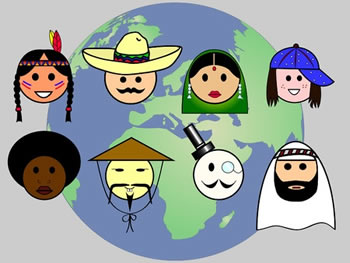Difference between Citizenship and Nationality
Key Difference: The primarily differentiating factor between citizenship and nationality is that citizenship is more of a political and legal concept, whereas nationality is more of a cultural and ethical notion.
 Citizenship and Nationality are two terms that are often used to define who a person is. However, while the two terms are often taken to mean the same thing, they are actually quite different from each other. The confusion between the terms arises from the fact that for most people, their citizenship and nationality are the same. Nevertheless that is not the case for everyone, and what most people don’t realize is that a person can have a citizenship that is different from their nationality.
Citizenship and Nationality are two terms that are often used to define who a person is. However, while the two terms are often taken to mean the same thing, they are actually quite different from each other. The confusion between the terms arises from the fact that for most people, their citizenship and nationality are the same. Nevertheless that is not the case for everyone, and what most people don’t realize is that a person can have a citizenship that is different from their nationality.
Both citizenship and nationality denote a sense of belonging. They both define a concept of a group of people that have something in common, either their ethnic background, or the place they were born, or the country whose government they report to. However, the primarily differentiating factor between citizenship and nationality is that citizenship is more of a political and legal concept, whereas nationality is more of a cultural and ethical notion.
Nationality is more closely associated with cultural identity. It can be associated with the place of birth, the place of parent’s births, place where the ancestors hail from, or the place where the person feels ethnically connected to.
Citizenship, on the other hand, is associated with the country whose government acknowledges the person as a resident that is protect by rights and liberties as provided by that government. Basically, the country with which the person can associated as a citizen of.
The problem with differentiating between these two contexts comes from the fact that many people think that the two are the same. In fact, in many instances even countries and government departments take the implication that the two are interchangeable. However, that is not the case. The two are very different and individual concepts, that tend to overlap.
 For example, a person might consider their nationality to be Native American, perhaps Cherokee. However, they would still be a citizen of the United States of America. Similarly, a person with a Tibetan nationality is still legally a citizen of China.
For example, a person might consider their nationality to be Native American, perhaps Cherokee. However, they would still be a citizen of the United States of America. Similarly, a person with a Tibetan nationality is still legally a citizen of China.
Another difference is when a person moves from one country to another. Hence, while their nationality will be associated with their birth country, they may eventually become citizens of their new country. For example, an Indian national may emigrate to the United States of America and eventually become a US citizen.
Comparison between Citizenship and Nationality:
|
|
Citizenship |
Nationality |
|
Definition (Oxford Dictionaries) |
The position or status of being a citizen of a particular country. |
The status of belonging to a particular nation. An ethnic group forming a part of one or more political nations. |
|
Concept |
Legal concept |
Ethnic or racial concept |
|
Root |
The country whose government acknowledges the person as a citizen |
Gotten from parents, grandparents, ancestors, ethnical groups |
Reference: Oxford Dictionaries (Citizenship and Nationality), Wikipedia (Citizenship and Nationality), EUDO Image Courtesy: brent.gov.uk, glossophilia.org









Add new comment